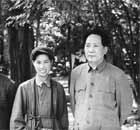Foreign and Military Affairs
Senior envoy leads delegation to DPRK
By Ai Yang (China Daily)
Updated: 2010-02-08 07:45
 |
Large Medium Small |
A senior Chinese envoy arrived in the Democratic People's Republic of Korea (DPRK) over the weekend to meet state officials in Pyongyang.
Wang Jiarui, head of the International Department of the Communist Party of China Central Committee, led the delegation to DPRK at the invitation of the International Affairs Department of the Central Committee of the Workers' Party of Korea, Xinhua reported.
Media generally viewed the move as Beijing's effort to persuade the DPRK to return to denuclearization negotiations in return for aid and other benefits.
DPRK state-run radio said Wang attended a banquet with his counterpart Kim Yong-il to "toast the traditional friendship" between the nations.
The Yonhap news agency in the Republic of Korea (ROK), said Wang is expected to deliver a message from President Hu Jintao to the DPRK leader.
Chinese analysts however predict that the envoy's visit will not result in any significant developments to the current situation.
"China only plays a limited role in drawing the DPRK back to the negotiating table," Said Wang Fan, a Korean studies expert at China Foreign Affairs University. Wang said that there are still many obstacles to be overcome before the US and the DPRK reach an agreement.
"Both the US and the DPRK should take a step back and make a compromise. For example the US could lift part of the sanctions first." Wang said. "Both parties should do something to break the deadlock first," The six nations could also sign an agreement to forbid any of the parties from abandoning the talks, he suggested.
The DPRK quit the Six-Party Talks in April last year, after the UN Security Council imposed sanctions on the DPRK over its nuclear and missile tests.
UN chief Ban Ki-moon's top political adviser, Lynn Pascoe, also arrived in Seoul over the weekend for talks with Foreign Minister Yu Myung-hwan and others before heading to Pyongyang.
Earlier this year Pyongyang said it required a peace treaty to formally end the Korean War, and that sanctions be lifted before it would resume talks on nuclear disarmament with the US, Japan, China, Russia and the ROK.
The proposed peace treaty will "positively promote the denuclearization of the Korean Peninsula at a rapid tempo", according to the DPRK Foreign Ministry.
Zhang Liangui, an expert on the DPRK with the Communist Party of China Central Committee Party School in Beijing disagreed with the view that Wang's visit was to pressure Pyongyang on nuclear talks but said the trip will "serve an important role in the future evolution of Sino-DPRK ties."
"It should be the DPRK rather than US to compromise for resuming the Six-Party Talks," Zhang said. "The DPRK wants to sign a peace treaty with US first, but that can't be done without first establishing diplomatic ties between the two countries."
Zhang said signing such a peace treaty is in essence recognizing the DPRK as a country that possesses nuclear arms, which would make the US lose ground in the future when it demands disarmament.
US Assistant Secretary of State Kurt Campbell dismissed the proposal and said the next step is for the DPRK to resume negotiations, although other matters could be discussed "within the six-party framework".
(China Daily 02/08/2010 page11)







